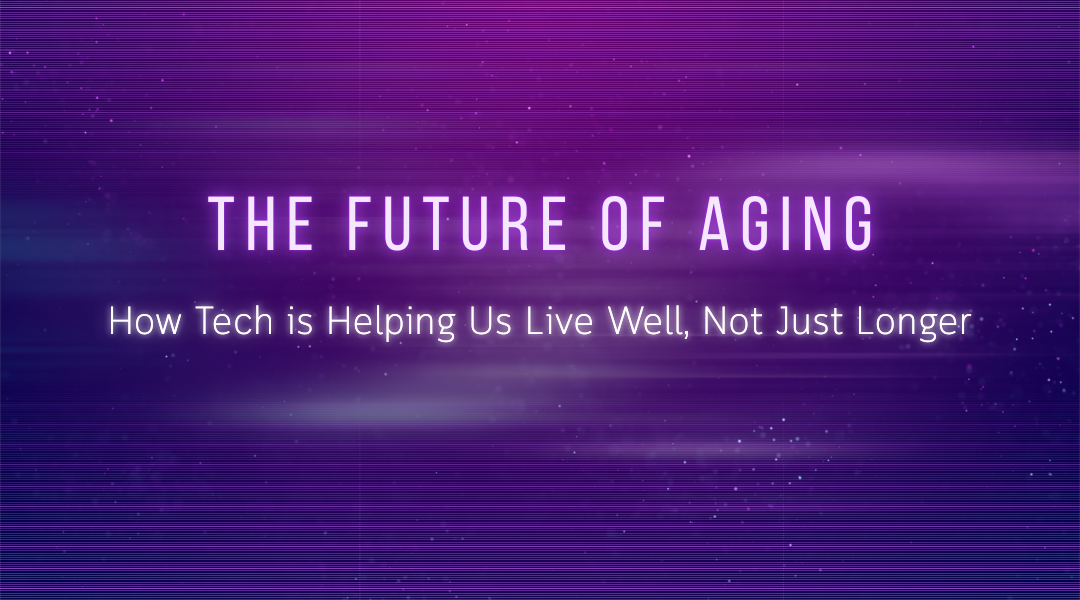We’ve all heard the saying, “It’s not the years in your life, but the life in your years.” Today, that idea is becoming reality—not through wishful thinking, but through a quiet revolution in healthcare. Advances in AI, biotech, and personalized medicine aren’t just adding years to our lives; they’re adding vitality to those years. The goal? A future where 80 feels like 60, where retirement doesn’t mean slowing down, and where aging isn’t about decline—but about possibility.
The New Longevity: Healthspan Over Lifespan
For decades, medical progress focused on helping people live longer. But longevity without quality is a hollow victory. The real breakthrough now is extending healthspan—the number of years we stay active, sharp, and free from chronic disease.
Imagine:
- A diabetic patient whose glucose levels are continuously monitored and adjusted by an AI, preventing complications before they start.
- A cancer survivor whose treatment was tailored to their genetics, minimizing side effects.
- A 75-year-old who stays mentally agile through brain-training apps and early dementia detection.
This isn’t science fiction. It’s happening now.
The Tech Making It Possible
1. AI as Your 24/7 Health Detective
AI isn’t replacing doctors—it’s giving them superpowers. By analyzing mountains of data (from lab results to sleep patterns), AI spots risks early. Some hospitals already use algorithms that predict heart attacks days before symptoms appear. Others deploy AI to customize rehab plans for stroke patients, speeding recovery.
2. Biotech’s Bold Promise: Repairing the Body
CRISPR gene editing, stem cell therapies, and senolytics (drugs that target aging cells) are moving from labs to clinics. Researchers are testing ways to reverse cellular aging, repair damaged tissues, and even regrow cartilage in arthritic joints. One experimental drug, rapamycin, is showing potential in slowing age-related decline—in dogs. Human trials are next.
3. Wearables That Do More Than Count Steps
The latest smartwatches don’t just track heart rate—they detect irregular rhythms, measure blood oxygen, and even predict stress levels. Implantable sensors (like those used by some diabetics) provide real-time health snapshots, alerting users and doctors to problems before they escalate.
The Bigger Picture: Health as a Symphony, Not a Solo Act
True wellness isn’t just about fixing problems—it’s about how everything connects.
- Prevention Beats Treatment: AI-powered apps like EarlyBird analyze speech patterns to flag early Parkinson’s risk—years before tremors appear.
- Personalized Medicine: Your ideal diet, exercise, and meds depend on your genes, gut microbiome, and lifestyle. Companies like Function Health offer $500 blood tests that give a hyper-detailed health roadmap.
- Brain Health Matters: Meditation apps, neurofeedback devices, and social robots combat loneliness—a silent killer linked to dementia and heart disease.
Why This Isn’t Just About Individuals
A society where people stay healthy longer changes everything:
- Work & Wisdom: Older adults remain in the workforce, mentoring younger colleagues or launching second careers.
- Economic Relief: Chronic disease costs the U.S. $3.7 trillion yearly. Slowing aging by just 2 years could save $38 trillion over decades.
- New Social Models: “Senior living” could mean co-housing with tech-enabled caregivers, not nursing homes.
The Hurdles We Can’t Ignore
- The Access Gap: Fancy health tech is useless if only the wealthy can afford it. Can startups like Zócalo Health (focused on Latino communities) democratize care?
- Data Privacy: Who owns your health data? Hackers already target hospitals. Stronger safeguards are non-negotiable.
- Over-Tech Skepticism: Not everyone wants a robot therapist. Balancing high-tech with human touch is key.
What’s Next? A Sneak Peek
- AI Coaches: Imagine a ChatGPT-like assistant that knows your medical history and nudges you toward healthier choices daily.
- Age-Reversal Trials: Biotech firms like Altos Labs (backed by Jeff Bezos) are exploring how to reset cells to a younger state.
- Smart Homes That Care: Future houses might adjust lighting for circadian health, dispense meds, and even detect falls—automatically calling for help.
The Bottom Line
We’re at a turning point. For the first time in history, technology isn’t just helping us survive—it’s helping us thrive deep into later life. The goal isn’t immortality. It’s making sure those extra years are spent hiking with grandkids, writing novels, or starting businesses—not trapped in a cycle of pills and hospital visits.
The future of aging isn’t about waiting for decline. It’s about rewriting the rules—and tech is handing us the pen.
